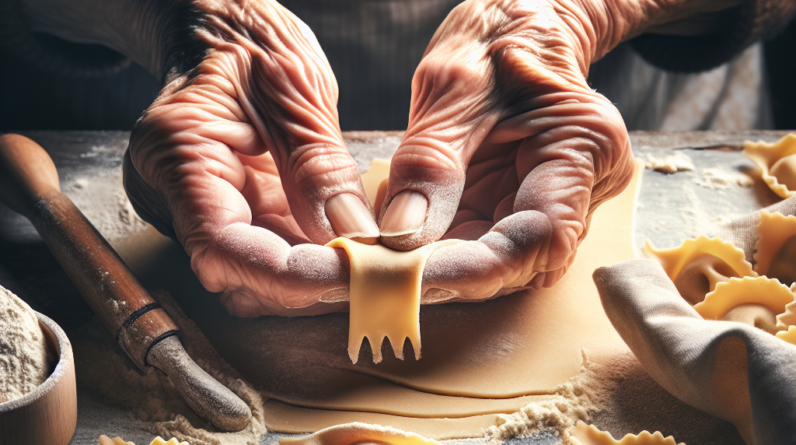Ah, the quest for the perfect al dente pasta, a culinary adventure filled with anticipation and flavor. In this article, we will explore some helpful tips to ensure that your pasta is cooked to perfection, with just the right amount of bite and texture. From selecting the right pasta shape to mastering the art of timing, we will guide you through the process of achieving that elusive al dente perfection. So grab your apron and let’s embark on this delicious journey together!

Choosing the Right Pasta
When it comes to cooking delicious pasta, one of the first things to consider is the pasta shape. The shape of the pasta can greatly impact the overall enjoyment of the dish. Different shapes hold sauces differently, and some shapes are better suited for specific dishes. For example, long and thin strands such as spaghetti pair well with light and delicate sauces, while tube-shaped pasta like penne are perfect for capturing chunky sauces. So, take a little time to consider the shape of pasta that best complements your desired dish.
Another important factor to consider when choosing pasta is its quality. Using high-quality pasta can make a world of difference in the final result of your dish. The texture will be better, the flavor will be more pronounced, and the pasta will hold its shape beautifully. Cheap and low-quality pasta tends to become mushy and flavorless when cooked, which can ruin the whole eating experience. So, invest in a good brand of pasta and treat yourself to a superior plate of pasta.
Salt the Water Adequately
Salt is essential for elevating the flavor of pasta while it cooks. Many people underestimate the importance of salting the cooking water, but it can truly make a difference in the taste of the final dish. To properly salt the water, it’s crucial to use plenty of water. The general rule of thumb is to use about 4 quarts of water for every pound of pasta. This ensures that the pasta has enough space to cook evenly and doesn’t stick together.
Once you have your abundant amount of water, don’t forget to add enough salt. A generous sprinkle of salt will not only enhance the taste of the pasta but also help season it from within. As the pasta absorbs the salted water, its flavor will become more well-rounded. Aim for about 1-2 tablespoons of salt per 4 quarts of water, depending on your taste preferences. Don’t worry, most of the salt will be left behind in the cooking water, so the final dish won’t end up being overly salty.
Bring the Water to a Rolling Boil
The next step in cooking perfect pasta is to bring the salted water to a rolling boil. This means that the water should be bubbling vigorously and have steady, large bubbles rising to the surface. Cooking pasta in properly boiling water ensures that it cooks evenly and prevents it from becoming overly soft or mushy.
When boiling the water, it’s essential to avoid overcrowding the pot. Adding too much pasta to a small pot of water can drastically lower the temperature, causing the pasta to stick together and cook unevenly. Always err on the side of caution and use a large pot to allow the pasta ample space to move around freely as it cooks.
Cooking Time and Testing Doneness
To determine the cooking time of your pasta, it’s best to follow the package instructions. Pasta brands vary, and each may have different recommended cooking times. Start monitoring the pasta a minute or two before the recommended time to prevent overcooking. Cooking pasta until it is al dente, meaning “to the tooth” in Italian, is the ideal goal. Al dente pasta is cooked until it is still slightly firm to the bite, providing a pleasant texture that holds up well with sauces.
To ensure your pasta is perfectly cooked, it’s important to taste it periodically as it nears the end of its cooking time. Take a strand or a piece of pasta and bite into it. If it is still too firm and lacks flavor, it needs more time. Conversely, if it is soft and mushy, it has been overcooked. The perfect al dente pasta should have a slight resistance when bitten into but still be tender and flavorful.

Timing and Coordination
To truly elevate your pasta dish, it’s crucial to coordinate the cooking of the pasta with the preparation of the sauce. Ideally, you want your sauce to be ready when the pasta is perfectly cooked and still hot. This way, the pasta can absorb the flavors of the sauce and marry together harmoniously.
To achieve this timing, start preparing your sauce while the pasta is cooking. It’s helpful to have all the ingredients prepped and ready to go before the pasta even hits the boiling water. This way, you can focus on cooking the sauce and ensuring it is seasoned and well-balanced. By the time the pasta is cooked, your sauce should be at the perfect stage of readiness, and you can simply toss the pasta into the sauce, giving it a quick stir to coat each strand or piece entirely.
Avoid Rinsing the Pasta
Once the pasta is cooked to perfection, the last thing you want to do is rinse it. Rinsing pasta removes the starch that clings to the surface, which is essential for helping the sauce adhere to the pasta. Additionally, rinsing can also wash away some of the cooked flavors and textures, leaving you with a lackluster dish.
To preserve the starch and enhance the taste of your pasta, immediately toss it with your sauce. The residual heat will help bind the sauce to the pasta, creating a flavorful and cohesive dish. If you find the pasta is sticking together, add a small amount of the reserved pasta water (more on that later) to help loosen it up and achieve the desired consistency.

Add Pasta Water to the Sauce
Don’t be so quick to dump all the cooking water down the drain once the pasta is cooked. Pasta water is a valuable asset in creating a delicious sauce. As the pasta cooks, it releases starch into the water, which can thicken and bind the sauce, giving it a silky and velvety texture.
Before draining the pasta, be sure to save some of the cooking water. This can be done by using a heatproof measuring cup or a ladle to carefully scoop out a cup or two of the starchy water. When your sauce is almost done, gradually add small amounts of the pasta water to it. Stir the sauce as you pour, and you’ll notice the water incorporating with the other ingredients, creating a cohesive and flavorful sauce that clings beautifully to the pasta.
Drain the Pasta Properly
When it’s time to drain the pasta, it’s important to do it properly to avoid any mishaps that could affect the overall dish. Before draining, once again, save a small amount of the cooking water in a separate bowl or measuring cup. This will come in handy in case you need to adjust the consistency of your sauce later on.
To drain the pasta, you can use a colander or a spider, which is a large, slotted spoon-like utensil specifically designed for lifting and draining pasta. Make sure to shake off any excess water from the pasta and allow it to drain completely. Avoid rinsing the pasta under cold water, as this can remove the starch that helps the sauce cling to it. After draining, promptly transfer the pasta to your sauce, ready to be mixed and served.
Serve Immediately
The key to enjoying perfectly cooked pasta is to serve it immediately once it’s tossed with the sauce. Pasta is at its best when it’s served hot and fresh, straight off the stove. Over time, pasta can continue to absorb the moisture from the sauce, causing it to become softer and lose its al dente texture. To savor the optimal texture and flavor, plate your pasta as soon as it’s ready, ensuring each portion receives the same level of warmth and freshness.
Troubleshooting
Sometimes, despite our best efforts, things don’t always go as planned. Here are some common pasta-related issues and ways to troubleshoot them:
Undercooked Pasta
If your pasta turns out slightly undercooked, don’t panic! This can be easily remedied by returning it to the boiling water for a couple of minutes. Keep a close eye on it and taste periodically until it reaches the desired doneness. Just be careful not to overcook it in the process.
Overcooked Pasta
Overcooked pasta can be disappointing, but all hope is not lost. If your pasta becomes mushy, you can salvage it by adding it to a hot skillet with a little olive oil or butter. Sauté the pasta for a few minutes until it becomes crisp and slightly golden on the edges. This will help revive the texture and add a delicious touch of flavor.
With these helpful tips in mind, you are well-equipped to cook the perfect al dente pasta. So gather your ingredients, heat up that pot of water, and get ready to enjoy a truly satisfying pasta dish that will impress even the most discerning palates. Happy cooking!










